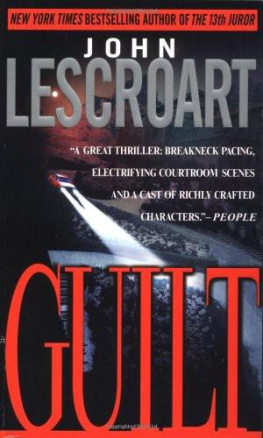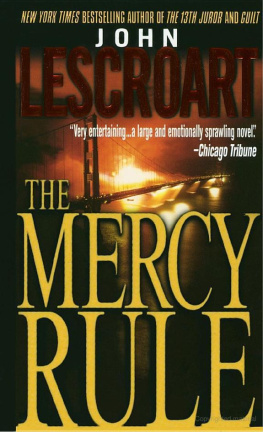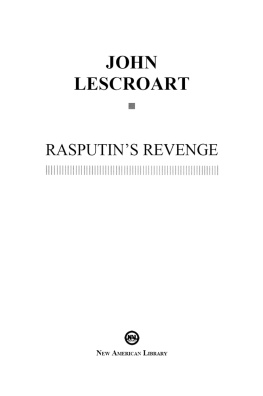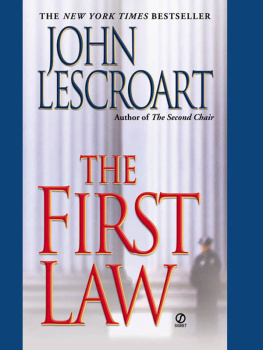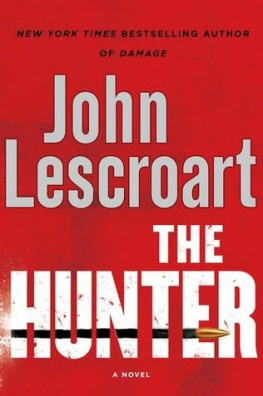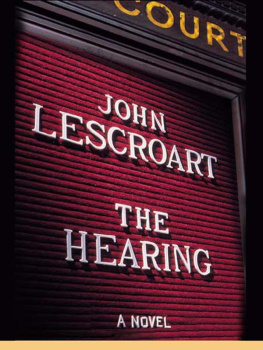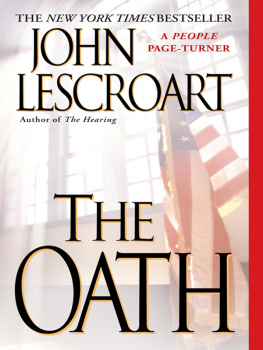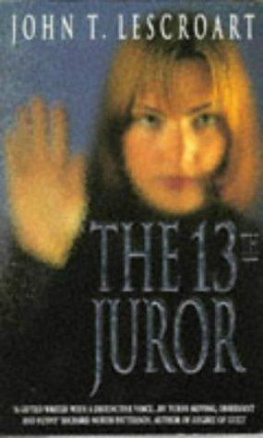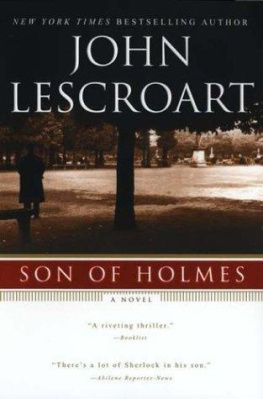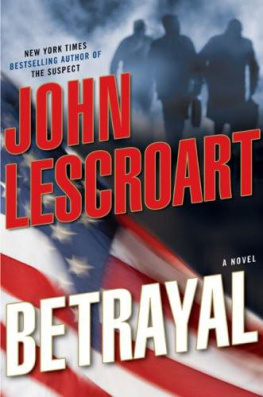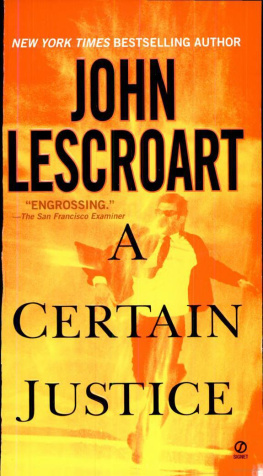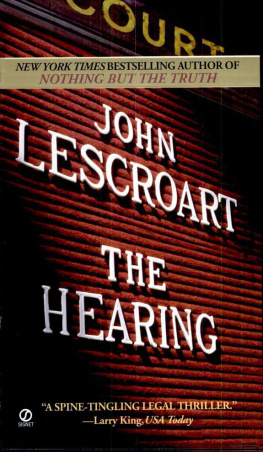John Lescroart - Guilt
Here you can read online John Lescroart - Guilt full text of the book (entire story) in english for free. Download pdf and epub, get meaning, cover and reviews about this ebook. year: 1998, publisher: Dell, genre: Detective and thriller. Description of the work, (preface) as well as reviews are available. Best literature library LitArk.com created for fans of good reading and offers a wide selection of genres:
Romance novel
Science fiction
Adventure
Detective
Science
History
Home and family
Prose
Art
Politics
Computer
Non-fiction
Religion
Business
Children
Humor
Choose a favorite category and find really read worthwhile books. Enjoy immersion in the world of imagination, feel the emotions of the characters or learn something new for yourself, make an fascinating discovery.
- Book:Guilt
- Author:
- Publisher:Dell
- Genre:
- Year:1998
- Rating:3 / 5
- Favourites:Add to favourites
- Your mark:
- 60
- 1
- 2
- 3
- 4
- 5
Guilt: summary, description and annotation
We offer to read an annotation, description, summary or preface (depends on what the author of the book "Guilt" wrote himself). If you haven't found the necessary information about the book — write in the comments, we will try to find it.
Guilt — read online for free the complete book (whole text) full work
Below is the text of the book, divided by pages. System saving the place of the last page read, allows you to conveniently read the book "Guilt" online for free, without having to search again every time where you left off. Put a bookmark, and you can go to the page where you finished reading at any time.
Font size:
Interval:
Bookmark:
GUILT
JohnLescroart
To Al Giannini, DonMatheson and- always - to Lisa
ACKNOWLEDGMENTS
Other valuable technical advicecame from Peter S. Dietrich, M.D., M.P.H.; Dr Boyd Stevens - SanFrancisco's coroner; Dianne Kubancik, R.N.; Bonnie Harmon, R.N.; DrMark and Kathryn Detzer; Dr Chris and Michelle Landon; Father DanLooney. Bill Mitchell, Communications Director of the Archdiocese ofSan Francisco, was kind enough to show me the Chancery Office andexpose me to a great deal of interesting arcana about the CatholicChurch.
For their personal support, theusual suspects - Karen Kijewski, William P. Wood, Richard and SheilaHerman - have been there with unfailing goodwill, advice, andgenerosity of spirit. Max Byrd is a terrific writer who's passed onsome terrific advice. Also thanks to my brother Emmett for his faith;to Robert Boulware for post-game head straightening; to Jackie Cantorfor everything; and to Andy Jalakas, a true believer. Finally, I'd liketo thank my agent, Barney Karpfinger, for helping to make the dream areality.
We do not see things as they are;We see things as we are.
Talmud
Part One
Mark Dooher couldn't take hiseyes off the young woman who had just entered the dining room at Fiord' Italia and was being seated, facing them, at a table ten feet away.
His companion for lunch was, likeDooher, an attorney. His name was Wes Farrell and he generallypracticed in a different strata - lower - than Dooher did. The two menhad been best friends since they were kids. Farrell glanced up from hiscalamari, his baleful eyes glinting with humor, trying to be subtle ashe took in the goddess across the room. 'Too young,' he said.
'My foot, Wes.'
'All parts of you, not just yourfoot. Besides which,' Farrell went on, 'you're married.'
'I am married.'
Farrell nodded. 'Keep repeatingit. It's good for you. I, on the other hand, am getting divorced.'
'I can never get divorced. Sheilawould never divorce me.'
'You could divorce her if youwanted to ...'
'Impossible.' Then, amending:'Not that I'd ever want to, of course, but impossible.'
'Why?'
Dooher went back to his pasta fora moment. 'Because, my son, even in our jaded age, when ninety percentof your income derives from your work as counsel to the Archdiocese ofSan Francisco, when you are in fact a prominent player in the RomanCatholic community, as I am, a divorce would play some havoc with yourbusiness. Across the board. Not just the Church itself, but all theancillary
Farrell broke off a bite-sizedpiece of Italian bread and dipped it into the little dish ofextra-virgin olive oil that rested between them. 'I doubt it. Peopleget divorced all the time. Your best friend, for example, is gettingdivorced right now. Have I mentioned that?'
'Lydia's divorcing you, Wes.You're not divorcing her. It's different. God,' he said, 'look at her.'
Farrell glanced up again. 'Shelooks good.'
'Good?' Dooher feasted foranother moment on the vision. 'That woman is so far beyond "good" thatthe light from "good" is going to take a year to get to her.'
'At which time, you'll be a yearolder and forever out of her reach. Pass the butter.'
'Butter will kill you, you know.'
Farrell nodded. 'Either that orsomething else. This calamari milleottocentoottantasei, forexample.'
'Or pronouncing it.'
A handsome young man in abusiness suit - every male customer in the restaurant wore a businesssuit - was approaching the woman's table. He pulled a chair out acrossfrom her, smiling, saying something. She was looking up at him, herexpression cool, reserved. Farrell noted it, and something else.
'Don't look now,' he said, 'butisn't the guy sitting down with her - doesn't he work for you?'
Wes Farrell was on his schlumpyway up toward Columbus and the North Beach walk-up out of which he ranhis law business. Dooher lingered in the doorway at Fior d'Italia, thenturned and went back inside to the bar, where he ordered a Pellegrino.
He sipped the bottled water andconsidered his reflection in the bar's mirror. He still looked good. Hehad his hair - the light brown streaked with blond, camouflaging thehint of gray that was only just beginning to appear around the temples.The skin of his face was as unlined as it had been at thirty.
Now, at forty-six, he knew helooked ten years younger, which was enough - any more youth would bebad for business. His body carried 180 pounds on a six-foot frame.Today he wore a tailored Italian double-breasted suit in a refinedshade of green that picked up the flecks in his eyes.
From where he sat at the bar, hecould watch her in profile. She had loosened up somewhat, but Wes hadbeen right - there was a tension in the way she sat, in her bodylanguage. The man with her was Joe Avery - again, Wes had nailed it - asixth-year associate at McCabe & Roth, the firm Dooher managed.(McCabe and Roth both had been forced to retire during the downsizingof the past two years. Now, in spite of the name, it was Dooher's firm,beginning to show profit again.)
He drank his Italian water,looked at himself in the mirror over the bar. What was he doing here?
He couldn't allow himself toleave. This was something he thought he'd outgrown long ago - such anoverwhelming physical attraction.
Oh sure, when he'd beenyounger... in college a couple of times... even the first few years ofhis marriage, the occasional dalliance, stepping out, somebody comingon to him, usually, on a business trip or one of the firm retreats.
But that had stopped after theone crisis, Sheila getting wind of what was going on with one of them.She wasn't going to have it. Infidelity wasn't going to be part oftheir lives. Dooher had better decide whether he wanted to sleep aroundor keep the kids.
A hundred times since, he wishedhe'd have let Sheila go, taking the kids with her.
But in truth, back then, fifteenyears ago, he was already unable to risk a divorce, already workingwith some of the charities, the Archdiocese itself. There was big moneythere, clean work. And Sheila would have scotched it if things hadgotten ugly.
He knew she would have. As shewould today.
So he'd simply put his hormonesout of his mind, put all of his effort into real life - work, the wife,the kids, the house. He would be satisfied with the ten-fifteen-twentydays of vacation, the new car.
Everyone else seemed to survivein that secure between-the-lines adult existence. It wasn't so bad.
Except Mark Dooher hated it. Henever got over hating it. He had never had to play by the samerules as everyone else. He was simply better at everything, smarter,more charismatic.
He deserved more. He deservedbetter.
That couldn't be allthere was. Do your job, live the routine, get old, die. That couldn'tbe it. Not for him.
He couldn't get the woman off hismind.
Well, he would just have to doit, that was all. He'd call up his fabled discipline and simply willher out of his consciousness. There was nothing to be done with heranyway. Dooher didn't trust the dynamic of lust, that hormonal rush andthen the long regret. No, he wasn't about to get involved with all that.
It was better just to stopthinking about her. Or at least not get confused, keep it in the realmof fantasy. It wasn't as if he knew anything about her, as if therecould be real attraction.
Font size:
Interval:
Bookmark:
Similar books «Guilt»
Look at similar books to Guilt. We have selected literature similar in name and meaning in the hope of providing readers with more options to find new, interesting, not yet read works.
Discussion, reviews of the book Guilt and just readers' own opinions. Leave your comments, write what you think about the work, its meaning or the main characters. Specify what exactly you liked and what you didn't like, and why you think so.

